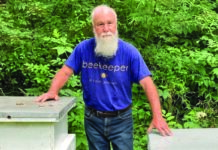Today’s News from the University of Kansas
From the Office of Public Affairs | http://www.news.ku.edu
Headlines
Contact: Jon Niccum, KU News Service, 785-864-7633, [email protected]
Expert advocates renaming US military posts memorializing Confederate officers
LAWRENCE — While serving for six years in the U.S. Army, Michael Hill trained at Fort Benning and Fort Gordon in Georgia and Fort Polk in Louisiana.
“For all that the Army does to try to educate soldiers and build ‘esprit de corps,’ I never was stationed at or visited a post where anyone discussed who the post was actually named after,” said Hill, a former Army paratrooper and a doctoral student in history at the University of Kansas.
So upon learning those bases were named for Confederate generals – who Hill considers “absolute traitors” – he delved into the history of how and why this came to be. His article “A Question of Treason? Confederate Generals and U.S. Army Post Names” appears in The Journal of America’s Military Past.
There are currently eight Army posts memorializing Confederate officers. All reside in former Confederate states. And all are now being scrutinized as public pressure mounts for the sites to be renamed.
Hill wrote, “In naming, and perhaps more importantly, maintaining Confederate-named posts, the federal government serves as an advocate for slavery and those who sought to rupture the country. It requires a romantic reading of the Civil War to conceive of these Confederate-named posts as anything other than an insult to the memories of those who fought and died to preserve the nation and destroy slavery.”
But how has this system endured for so long without much resistance prior to the George Floyd protests? Hill explained it’s due to what historians refer to as the Lost Cause ideology.
“It’s an interpretation of the Civil War initially put forward by ex-Confederates themselves that took root in the entire country. Largely through the work of organizations such as the United Daughters of the Confederacy, this had a great influence over school textbooks and things like that. They just basically ignored the role that slavery played in the Civil War,” he said.
“Instead, the war became, in some ways, almost like a friendly disagreement between brothers.”
Hill believes that viewpoint has been perpetuated by the military itself.
“When I was in the Army — and I got out in 2007 — if you spoke to military personnel and officers, they would tell you the Southern army was better than the Northern army. Southern generals were better than Northern generals. But the North just had greater industry and greater population, and that’s why they won. The Lost Cause mythology became so ingrained that when it came time to name these posts during World War I and World War II, it just seemed a natural choice,” he said.
Without this concerted effort to bolster the Lost Cause narrative, Americans might have been raised with a much different opinion of the South’s role in the “War Between the States.”
“We have to remember that Southerners were the first Americans to lose a war,” Hill said.
“They believed slavery was an institution created by God for the betterment of human beings, and they believed God was on their side. So when they lost, clearly God had abandoned them. They knew if they didn’t do something to shape history, then history would remember them in a negative light.”
Hill became interested in this topic while working on his master’s degree in history. When reading a book called “Ordeal By Fire: The Civil War and Reconstruction” by James McPherson, he ran across a passage about Confederate general Braxton Bragg.
“Having been in the airborne myself – and Fort Bragg, North Carolina, is the home of the airborne — all of a sudden it dawned on me. ‘Wait a second. This is that guy!” he said.
The topic provided the foundation for his master’s thesis, which he completed in 2013.
An Army brat born in Washington, D.C., Hill called numerous places home, from Delaware to Colorado to Germany. Now in his sixth year at KU, his research focuses on U.S. Empire, the North American West and U.S. foreign relations. (“It sounds like three different things, but it’s really all tied closely together,” he said.)
Hill is not surprised it took until 2020 for society to actively reevaluate whether American military posts should be named after Confederate generals. But he’s pleased it’s now up for debate.
“I was hoping that at some point our country would be willing to have this conversation. I don’t know if we’re necessarily willing to have it so much as being forced to have it – which is a good thing, I suppose,” he said. “I hope it complicates our understanding of what on the surface seemed like a fairly straightforward process. Maybe this will make people reconsider their position.”
Five years from now, will there be any Army posts left with Confederate names?
“Historians make terrible prophets,” Hill said. “My gut tells me no. But I would not place a bet on that.”
——————————————————-
KU News Service
1450 Jayhawk Blvd.
Lawrence KS 66045
Phone: 785-864-3256
Fax: 785-864-3339
Erinn Barcomb-Peterson, director of news and media relations, [email protected]
Today’s News is a free service from the Office of Public Affairs




